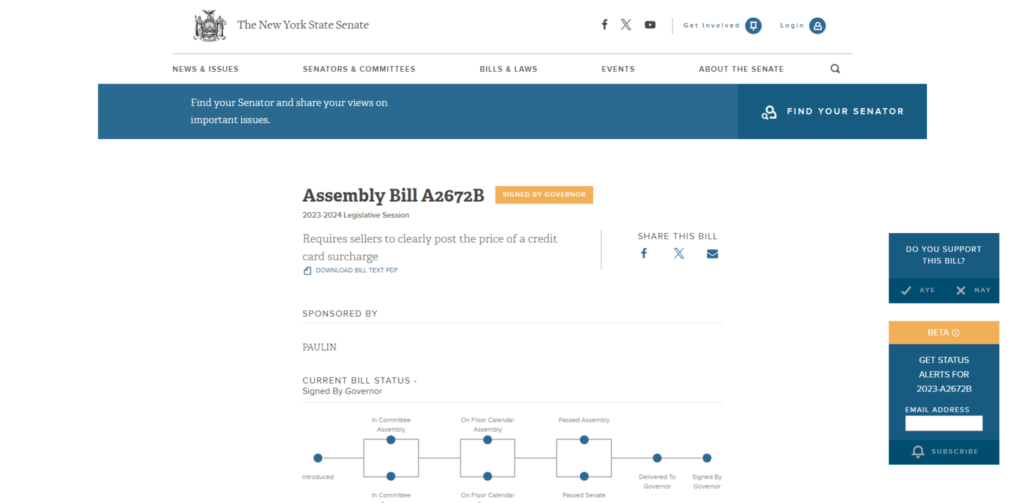Last year, on December 13, 2023, New York introduced Assembly Bill No. 2672 (Act), modifying the existing ban on credit card surcharges. Governor Hochul endorsed two laws designed to safeguard consumers. The first law requires clear notifications to consumers about upcoming automatic renewals for subscriptions, including explicit instructions for cancellation. The second law addresses pricing clarity, mandating merchants to display the highest possible price a consumer might pay for a product, irrespective of the payment method used. So, what is the impact of this new surcharge law in New York on merchants? Let us find out.
Starting from February 11, 2024, these laws will be in place. When customers purchase using a credit card, merchants must inform the buyers about the highest price that applies during the transaction. They should also let customers know the price for payment methods like checks, debit cards, or cash. It’s important to note that any additional charges cannot go beyond what the businesses charge by their credit card processor. This means these charges can only be passed on to customers without markups. Failure to comply with these regulations may lead to penalties of up to $500 per violation.

Image source
Key Takeaways:
- Revamping Credit Card Surcharges in New York: New York’s Assembly Bill No. 2672, signed into law by Governor Kathy Hochul, marks a significant shift in the regulation of credit card surcharges. Merchants can now impose surcharges with clear conditions, including transparent display and adherence to credit card company processing fees.
- Enhanced Consumer Protection and Transparency: The legislative changes aim to improve consumer protection and transparency in pricing. Merchants must now clearly display the total price for items in credit card transactions, including surcharges, and ensure that these surcharges do not exceed the credit card company’s transaction processing fees.
- Dual Pricing System and Compliance Measures: The amended law formalizes a two-tier pricing system, allowing merchants to display distinct prices for credit card and cash transactions. Non-compliance may result in civil penalties of up to $500 per violation, with enforcement by municipal consumer affairs offices or designated legal representatives.
- National Trends in Credit Card Surcharges: Despite New York’s flexibility on credit card surcharges, a broader trend towards limiting such charges is evident. New Jersey has passed similar restrictions, and credit card issuers like Visa are actively enforcing regulations. US lawmakers are also considering the CCC Act of 2023, aiming to introduce more competition in the credit card processing sector, indicating ongoing debates and challenges in this regulatory landscape.
Surcharge Law In New York

Governor Kathy Hochul has enacted a modification to Section 518 of the New York General Business Law through the signing of Assembly Bill No. 2672. The previous law prohibited merchants from adding a surcharge when customers chose to pay for services or goods with a credit card. With the amendment, merchants are now explicitly allowed to impose a surcharge, provided they adhere to the following conditions:
- Display the total price for an item in credit card transactions, including the applicable surcharge.
- Ensure that the surcharge does not exceed the amount charged to the merchant for transaction processing by the credit card company.
Governor Hochul, a Democrat, highlighted the law in a press release on December 13, presenting it as a measure to enhance consumer protection and boost purchasing power for New Yorkers.
Legislators supporting the law emphasized its benefits for consumers, emphasizing increased transparency in understanding the final transaction cost before checkout. Jeremy Cooney, Democratic Sen., stated in a press release that transparency in pricing is essential for informed decision-making when spending hard-earned money.
This legislative amendment makes the New York Court of Appeals ruling in the Expression Hair Design vs. Schneiderman case official. The court’s decision emphasized that any additional fee for customers using credit cards should be included in the price rather than being shown as a separate surcharge. The revised law now allows merchants to have a two-tier pricing system displaying two prices: one for credit card transactions (including the surcharge) and another for cash transactions (without the surcharge). This system often leads merchants to adjust prices for all products to include the surcharge, along with providing a discount on the surcharge amount for customers who pay with checks, debit cards, or cash.
The New York law allows businesses to implement a dual pricing system. According to the governor’s release, New York businesses can display two prices for specific sales transactions—one for credit card payments and another for cash transactions. The legislation aims to foster transparency and ensure consumers are well-informed about their purchases by mandating that businesses disclose the highest potential price a consumer might pay.
Merchants found violating the amended law may face civil penalties, capped at $500 per violation. Enforcement can be carried out concurrently by the director or commissioner of a municipal consumer affairs office or by designated legal representatives of a municipality or local government, such as a town attorney or city corporation counsel. The amended law is set to become effective on February 11, 2024.
This recent legislation grants merchants added flexibility in deciding whether to transfer the expense of credit card acceptance to customers. However, it maintains the ongoing trend of requiring merchants to assess individual state regulations to ascertain specific requirements regarding how the surcharge should be presented to the customer.
Kristen Larson, a counsel attorney affiliated with Ballard Spahr in Minneapolis, noted the growing federal emphasis on transparent pricing. There is a concern at the national level that consumers might only be fully aware of the costs associated with the services and products they purchase once they reach the checkout or POS and encounter additional fees. Larson expressed the view that New York aims to address this potential confusion.
Trend Towards Limiting Credit Card Surcharges Gains Traction

Despite the recent state law providing merchants with more flexibility on credit card surcharges, credit card issuers and networks are pushing to curb the surcharges imposed by merchants. Similarly, in August, New Jersey passed a law mandating merchants to restrict credit card surcharges to the actual costs incurred in processing payments.
Visa has also taken steps to enforce credit card surcharge regulations, notifying payment processors that compliance with their standards will be strictly monitored, and any non-compliance could lead to fines of up to $1 million.
Additionally, US lawmakers, led by Dick Durbin and Roger Marshall, support the CCC (Credit Card Competition) Act of 2023, aiming to introduce more competition into the credit card processing sector. While the bill has yet to secure a vote in either chamber, retailers and supporters are gearing up to push for its passage, while opponents from banks and card companies are preparing for the upcoming debate.
All in all, from a policy standpoint, the law is grounded in the idea that promptly revealing the credit card price for a product or service enhances transparency for consumers who might otherwise be unaware of a surcharge until the checkout stage.
Assemblymember Amy Paulin emphasizes that the new regulation ensures clear disclosure of credit card surcharges, allowing consumers to be fully informed from the outset rather than discovering such fees only during the payment process. The legislation prioritizes transparency, fairness, and the prevention of consumer misguidance when using credit cards for purchases.
Conclusion
Implementing the surcharge law in New York, effective February 11, 2024, marks a significant shift in credit card transaction practices. This legislative amendment allows merchants to impose surcharges, provided they adhere to strict conditions, including clear display and compliance to processing fees. Governor Hochul’s approval reflects a commitment to consumer protection and transparency in pricing.
The law formalizes the court ruling and enables a dual pricing system, encouraging informed consumer decision-making. However, the broader trend towards limiting credit card surcharges, both at the state and federal levels, suggests ongoing challenges and debates within the credit card processing sector. The law, grounded in transparency and consumer fairness, emphasizes the importance of clear disclosure in credit card transactions.

